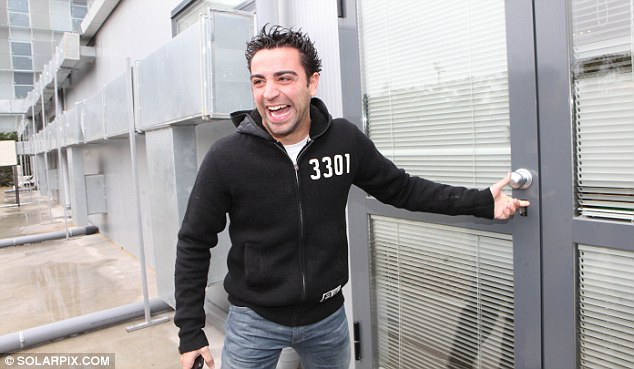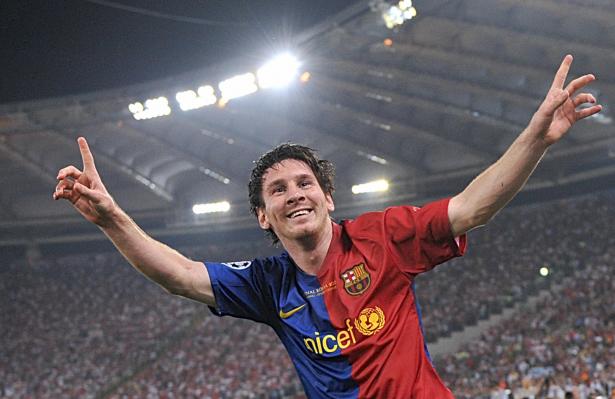This is a great interview with Xavi Hernandez, the differences between English and Spanish football; you just can even begin to compare. English Football at early ages is all about win, win, win. Spanish is all about development and keep, keep, keep the ball!
Xavi Hernandez had given a man-of-the-match performance against Germany, and Spain were two minutes from reaching the World Cup final when the referee in last year’s semi-final asked him if he could have his shirt after the game. ‘If you blow the whistle a minute early, it’s yours,’ he replied.
On the verge of reaching the pinnacle of his career, the final where he would complete his full house of major honours, the sorcerer supreme of Barcelona and Spain’s magical midfields, the most unassuming of world beaters, still wasn’t taking things too seriously.
 Listening to him talk about his English football heroes ahead of next week’s visit to London, it’s obvious the sport he loves and demystifies so eloquently is still, first and foremost, just a game to him — one which he and his pals just happen to play better than anybody else in the world.
Listening to him talk about his English football heroes ahead of next week’s visit to London, it’s obvious the sport he loves and demystifies so eloquently is still, first and foremost, just a game to him — one which he and his pals just happen to play better than anybody else in the world.
His face lights up first when he is told the story of Wayne Rooney getting up from his couch to give Barca a one-man standing ovation in his living room as he watched them beat Real Madrid 5-0 last November, and then when he reels off the names of his current Premier League favourites.
‘Rooney, Scholes, Cesc (Fabregas), Nasri and Giggs,’ he says, adding: ‘I was also a big fan of John Barnes, Chris Waddle and Matt Le Tissier. And although it is a different style, I liked the Paul Ince and Roy Keane partnership Manchester United had. They would have been my team had I moved to England.’
Paul Scholes receives special praise: ‘In the last 15 to 20 years the best central midfielder that I have seen — the most complete — is Scholes. I have spoken with Xabi Alonso about this many times. Scholes is a spectacular player who has everything.
THE GAMES… THE GOALS…
THE GLORY…
Full name: Xavier Hernandez i Creus.
Age: 31.
Position: Midfielder.
Club: Barcelona (Debut: 1998;
557 appearances; 56 goals).
Club Honours: 5 x La Liga (1999, 2005, 2006, 2009, 2010); Copa Del Rey (2009);
2 x Champions League (2006, 2009); European Super Cup (’09); FIFA Club World Cup (’09).
Country: Spain (Debut 2000: 98 caps; 12 goals).
National Honours: Euro 2008; World Cup 2010.
Personal Honours: 2 x Ballon d’Or 3rd place (09, 10); Euro 2008 Player of the Tournament.
‘He can play the final pass, he can score, he is strong, he never gets knocked off the ball and he doesn’t give possession away. If he had been Spanish then maybe he would have been valued more.’
Xavi won the World Cup aged 30, one year older than Scholes when he retired from international football feeling undervalued by the then England coach Sven Goran Eriksson.
So why is the pass master, so revered in Spain, often discarded in England? For Xavi it starts in the stands with the difference between English and Spanish football culture.
‘You are a nation of warriors,’ he says. ‘If I go to Liverpool’s ground and someone puts the ball into the area and Carragher hammers it out of play then the fans applaud. In the Nou Camp you would never be applauded for that.
‘It’s a different culture that values different things. Here if they see you are afraid when you are in possession then you get whistled. It’s the world in reverse.
‘I do see it changing slightly. Before, the typical No 9 in England was a Crouch or a Heskey and it was a long ball from the back from a Terry or a Carragher and nothing in between.’
So a shift in emphasis is needed but it shouldn’t come completely at the expense of the traditional uncompromising English centre half, says Xavi.
 ‘I don’t want to be misunderstood. I have huge admiration for both Terry and Carragher. We have (Carles) Puyol here. Technically he is not the best player in the squad but he is a great defender. Players like Terry and Carragher are very necessary but they have to adapt to the team as opposed to the team adapting to them. In some ways what these players do has even more merit because to me it comes naturally.
‘I don’t want to be misunderstood. I have huge admiration for both Terry and Carragher. We have (Carles) Puyol here. Technically he is not the best player in the squad but he is a great defender. Players like Terry and Carragher are very necessary but they have to adapt to the team as opposed to the team adapting to them. In some ways what these players do has even more merit because to me it comes naturally.
‘For Iniesta, Messi and Rooney it comes naturally, but for them it is much more difficult to lift the head and play a pass. But they should have to adapt to the more technically gifted players, not the other way around.’
A ‘skill -over- strength’ revolution is mooted every time England fail at a World Cup, but Xavi says a radical overhaul of values would mean nothing unless it started at kids’ level.
‘You have to find the players who have the technical ability right from the off as Barcelona do,’ he says.
‘Other teams look for young players who are tall, big and strong. There are teams here in Catalunya who at the under 10s level will beat Barca’s under 10s.
‘But from that Barca under 10s team you will end up getting three footballers and from the under 10s of the other team not even one will make it. They are already thinking about winning instead of unearthing the technically gifted players which is Barcelona’s priority.
‘You spot a youngster who can lift his head and play a first-time pass and you think, “He’s worth something, let’s have him come and train with us”.’

The fact that the Barca philosophy is drilled into players before they are even teenagers is what then gives Barcelona the edge over other sides who attempt to play the same way.
‘Watching Arsenal is almost like watching Barca. Everything goes through Cesc and Nasri,’ says Xavi.
‘But the difference is that at Arsenal each player is a product of whatever youth system he came through. Here we have players who have been at the club for 10 or 12 years and that is the difference — everything comes automatically.
ON THE ENGLISH WAY
‘You are a nation of warriors. Carragher and Terry are your equal to Carles Puyol’
ON THE BARCELONA WAY
‘From the age of 10, they make you think of the shame of losing the ball’
ON BEATING REAL 5-0
‘They hardly touched the ball, and we stood in the dressing room clapping ourselves for a minute’
‘Here they make you think from day one. The first thing you do when you join this club is rondo (the passing drill with one player trying to win the ball back and three or four players passing one-touch between themselves). It’s think, think, think, and it teaches you the responsibility of keeping the ball and the shame of losing it.
‘You lift your head before you receive the ball, you look to see if you are in space, and who else is in space, and you play the ball first time. Modern football is so quick that two touches means too slow.’
Arsenal remain the closest thing to Barcelona in English football, but their Barca-Lite tag is a generous one after six years without a trophy. Would such a drought be tolerated at the Nou Camp?
‘If you go two years without winning things here then you have to change everything,’ says Xavi. ‘But you change the people, not the ideology. The philosophy you can’t ever lose. The fans here are not going to understand a team that sits back and plays on the counter-attack.’
Back in 2008 Barcelona had gone two years without winning anything and rumours circulated that Xavi might be part of a clear-out.
‘When Ronaldinho and Deco left there was talk of “Sell Xavi to help us bring Cesc”, but along came Pep (Guardiola) and he said that he did not see a Barcelona without me. That was the end of it.’
Next week’s opponents, Arsenal, may well have been his most suitable destination although he believes he would have adapted to any team and thrived with the passion of Premier League crowds.
 ‘I have never seen anything like the supporters there. We won 3-1 at Liverpool once and we were applauded off the pitch, and Liverpool were as well. All the players who go to England to play come back saying wonderful things about it, the fans, the people. I think I would have liked it.’
‘I have never seen anything like the supporters there. We won 3-1 at Liverpool once and we were applauded off the pitch, and Liverpool were as well. All the players who go to England to play come back saying wonderful things about it, the fans, the people. I think I would have liked it.’
Xavi stayed in 2008 and after Guardiola’s Barcelona took just one point from their first two games they won their third handsomely and went on to win an unprecedented six out of six trophies.
‘Who knows what would have happened if we had drawn that third game. They might have said, “This guy can’t carry on”. But I knew straightaway that Pep would be successful. He would be a success anywhere in the world,’ says Xavi. ‘Intelligence is being able to adapt to anything and Pep is very intelligent.
 ‘Normally a coach needs two or three years — he is a one-off. When we signed him I just thought, “Madre mia, we are going to go off like a shot”. He is so persistent.
‘Normally a coach needs two or three years — he is a one-off. When we signed him I just thought, “Madre mia, we are going to go off like a shot”. He is so persistent.
‘If he was a musician he would be a very good musician, if he was a psychologist, he would be a very good psychologist. He expects the maximum from himself and that rubs off on others.’
And it’s the football demanded by Guardiola and not just the results garnered by it that Xavi is so enamoured with.
‘We go out from the first moment looking for the ball and looking to put pressure on the opposition. If you are not going to pass the ball then why play the game. That is not football in my opinion.
 ‘For another coach — someone like (Javier) Clemente or (Fabio) Capello — they may have another idea of football but it is good that the Barcelona idea works. What were Holland looking for in the World Cup final? A Robben counter-attack? Penalties? We won a lot of games 1-0 but it was the opposition that were boring, not us.’
‘For another coach — someone like (Javier) Clemente or (Fabio) Capello — they may have another idea of football but it is good that the Barcelona idea works. What were Holland looking for in the World Cup final? A Robben counter-attack? Penalties? We won a lot of games 1-0 but it was the opposition that were boring, not us.’
The smothering tactics used by the Dutch are copied, with less and less success, every week in La Liga but Xavi has learned to live with the close attention.
‘I spend the entire 90 minutes looking for space on the pitch. I’m always between the opposition’s two holding midfielders and thinking, “The defence is here so I get the ball and I go there to where the space is”.’
His team-mates make it easy for him, he says. ‘My job is to pass the ball, and I have Messi, Iniesta, Pedro, Villa and Alves all showing for passes. It gets to the point where I think they are going to get annoyed with me because I have played three passes without giving the ball to Messi or that Alves has gone forward three times and I have not given it to him once. When Messi is not in the game he switches off!’
The gap that Barcelona have now created between themselves and the rest was never so obvious as in November last year with that 5-0 win over Real Madrid so appreciated by Rooney.
‘It is a source of great pride that an extraordinary player like Rooney, someone who could play perfectly well in Barcelona’s system, feels that way,’ says Xavi.
 ‘The 5-0 was the best game I have ever played in. There are more important games like the World Cup final but the feeling of superiority was incredible — it is one thing to have it against another team but against Real Madrid? They hardly touched the ball. We gave ourselves a minute’s round of applause in the dressing room afterwards.’
‘The 5-0 was the best game I have ever played in. There are more important games like the World Cup final but the feeling of superiority was incredible — it is one thing to have it against another team but against Real Madrid? They hardly touched the ball. We gave ourselves a minute’s round of applause in the dressing room afterwards.’
Last year the Champions League held special importance for Barcelona precisely because the final was to be played at the home of their great rivals. This year Wembley provides the added spice. ‘It is all about nostalgia. Getting to the final is great wherever it is played but Wembley is special,’ says Xavi. ‘It’s special for everybody in football but for Barcelona more so because of our first European Cup.’
And to close, he recalls that night 19 years ago when Barcelona first held the trophy aloft. ‘I was only 12 years old and I was not allowed to go to London. My two brothers went and I cried to my parents but they said I was too young. I remember watching the (Ronald) Koeman goal at home on television. If we can get there again this time I will be able to make up for that.’
Thanks to Paul Jenson of the Mail Online for this Article
 Football at under age is not about winning but about playing, development, teaching the kids the fundamental of the game and having fun is a major part of that!
Football at under age is not about winning but about playing, development, teaching the kids the fundamental of the game and having fun is a major part of that!
























